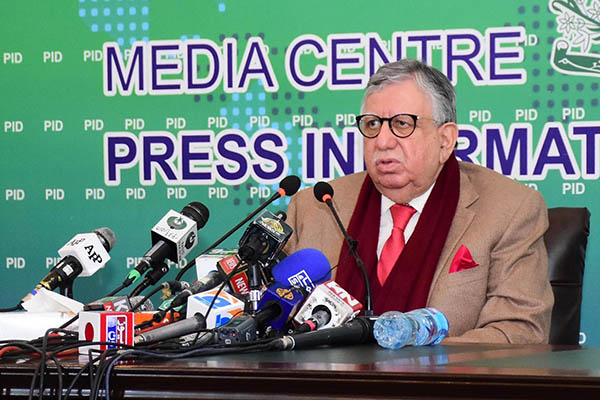
Photo courtesy PID
Finance minister says government considering options to raise incomes of salaried class to help them cope with commodity price hikes
The current bout of inflation facing nearly all essential commodities is unlikely to subside in the near future, Finance Minister Shaukat Tarin warned on Wednesday, admitting that this was proving especially troubling for Pakistan’s salaried class.
“The prices [of commodities] hiked up to 90 percent in the international market,” he told a press conference at the Pak-China Center in Islamabad. “Trade deficit increased due to the rise in oil prices while the Afghan crisis weighed down Pakistan’s currency,” he said, reiterating the government’s stance of inflation being primarily a result of prices in the global market.
Admitting that the salaried class, especially those belonging to the middle and lower-middle classes, were facing the brunt of inflationary pressures, he said the government was developing a plan to increase their income. To a question, he claimed the plan would be “innovative” as it could not impact the budget or the country’s deficit target, but refused to offer any further details until it had been firmed up.
Claiming that the current account deficit would reduce in the “coming months” after the government halted imports of COVID-19 vaccines, wheat and sugar, he hoped this would coincide with exports hitting their target of $31 billion in the current fiscal year. Remittances, he noted, were increasing by 11 percent this year compared to 29 percent last year.
IMF program
The minister stressed that the government would not back out of implementing the program demanded by the International Monetary Fund, adding that he hoped the State Bank of Pakistan Amendment Bill, 2021 would be passed by the Senate before the global lender is set to decide on reviving a stalled bailout program on Feb. 2. “Yes, we requested the IMF to delay the meeting of its Executive Board from Jan. 28 to Feb. 2, as the SBP Amendment Bill could not be passed by the Senate. We are now hopeful that it will be done before the envisaged deadline,” he said.
On trade with Afghanistan, Tarin said the government was weighing the option seriously, adding that measures had been taken to allow trade with the Pakistani rupee, rather than the U.S. dollar, which has reportedly been aiding in the rupee’s slide against the greenback.
Referring to Prime Minister Imran Khan’s upcoming visit to China to attend the inauguration of the Winter Olympics, he said Islamabad would request Beijing to relocate export-oriented industries to Pakistan to help it bridge the gap between imports and exports.
To a question about the latest Transparency International Corruption Perceptions Index 2021 that saw Pakistan’s rank slide by 16 points, he said the government would contest it once the full report had been made public. To another question, he claimed Prime Minister Imran Khan’s wealth had not increased because of any corruption. Upon receiving a follow-up on how Khan’s income tax payment had spiked from Rs. 200,000 to Rs. 9.8 million in just one year, he claimed this was just a matter of “millions” and “not billions.”
Summarizing the state of Pakistan’s economy, he said the State Bank of Pakistan had revised downward the GDP growth projection for the current fiscal from 5.5 percent to 4.5 percent but he believed it could still hit 5 percent. He claimed that the incumbent government had faced four major crises during its rule: a current account deficit of $20 billion against foreign currency reserves of $7.1 billion in 2017-18; the COVID-19 pandemic; global inflation of essential commodities; and the Afghanistan crisis that had caused $20 million to be smuggled from Pakistan daily.
